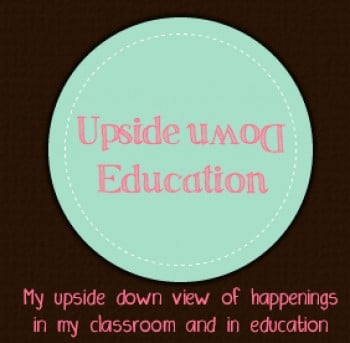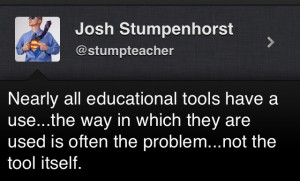So I saw this tweet from Josh Stumpenhorst today.
It made me think of tools I use and how I use them verus way others would use them. I started thinking about how the number one tool still used by teachers is the textbook. It is still the primary source of information. Textbooks are not 100% bad, I use my science text books. They are crappy, falling apart, full of curse words in sharpie, missing pages, etc. But they have great pictures, charts, and graphics. It uses a lot of graphic organizers for concepts that can be somewhat abstract. I teach earth/space science and many space concepts take days of videos, pictures, explanations, etc to them to have an “ah-ha I got it” moment. The text is just one part of this, but some times copying the picture and describing in their own words gets them to that moment.
I think the reason the textbook popped in my mind is because earlier today I was thinking about how when I first started teaching science, I thought it was so cool that mine had each step of EDL (entry, descent, landing) for Mars rovers. I use Mars rovers to teach a few concepts, future of space program, problem solving – how would you land something on another planet, different wave lengths – the instruments use different wavelengths to send back info, and more. But we always go step by step through EDL. We look at each step in the book and the kids are usually “oh ok that’s cool and all” and then we watch this video that explains the six minutes of EDL:
Every time I show this to kids they cheer when the airbags deploy and the rover bounces. They do not cheer with the book. But they have a better understanding when they watch the video. Text books cannot be the only tool. We know this, yet when as teachers we get lazy, we do it.
Also, we hear this time and again textbooks quickly become outdated. I am sure every single teacher in the classroom will agree to this, yet they still use texts as their top source for true and up-to-date information. Back to Mars rovers, you see in 2008 when I first taught EDL I thought the text was so cool that it had this recent information. But on August 5, 2012 there will be another Mars rover landing. (For those who haven’t heard I will be at the JPL attending the #NASAsocial – here is more info in case you are wondering #shamelessbragging) You see, it will take 7 minutes instead of 6 to land a rover on Mars. There will be no airbags. Now BAM, just like that, my video and my textbook is out of date. This is what will happen that day:
So you see we go back to the tweet that Josh sent out, it is not the tool itself. It is all about how we use them. It is about whether we use multiple tools and don’t rely on just one. It is about how up-to-date we are as teachers, do we constantly look for best ways to use these tools as well as staying current with our curriculum.


The “Social Learning” class that I’m teaching this week introduces the teachers to these kinds of tools. Tools to help improve their instruction. I saw Josh’s tweet earlier and thought it related directly to the class.
As I started with Twitter and social bookmarking today, I started thinking about faucets and cups. A faucet is where you get information from – YouTube, in your example above. A cup is where you store your resources – Delicious, Evernote, etc. At any rate, there are so many different tools available that sometimes I think it’s overwhelming to teachers and we don’t use any of the tools well. Sometimes you need to settle on a path and devote time to it. You, for example, have a great handle on NASA and YouTube – they compliment your curriculum extremely well.
Great post. Thanks for giving me some more content for this week 🙂
I’d add that so many of our teacher tools are content delivery related, rather than being tools for teaching students how to be makers of meaning. In the middle ages students were taught how to be copyists of material – republishers, if you will, of manuscripts. But they were also taught to be illustrators and organizers of material using concepts like the Ars Notoria (notary arts). I wonder if, by providing elaborately illustrated and graphic’ed textbooks, we’re limiting what students can learn… We don’t really teach kids how to use textbooks as aids to memory any more — it’s one more failure in our existing system.